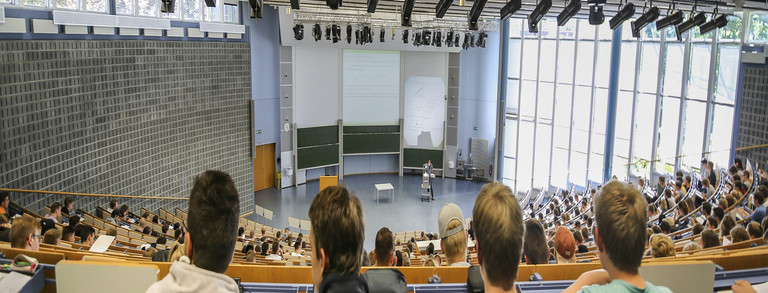Science Journalism
Summary
| Degree | Bachelor of Arts (B.A.) |
|---|---|
| Subject group | Social Sciences and Cultural Studies |
| Standard program duration | 8 semesters |
| Admission requirements |
Restricted admission (NC) for program semester 1-6
Details |
| Start of studies |
Winter semester
|
| Language | German |
| Enrollment requirements | |
| Further information | Website of the Institute for Journalism |
Overview
Right from the start, the Bachelor’s degree program combines journalistic skills (research, interview training, instructional editing, media law, journalism research, ethics) with knowledge from a second subject. The choices are medicine & life sciences, physics, technical journalism or data journalism.
A one-year internship with renowned media is an integral part of the program.
Skills and knowledge
The education at the Institute of Journalism is very practice-oriented and tailored to journalism. That is why applicants must prove that they have completed a six-week internship in an editorial office as a prerequisite for enrollment. During the internship, prospective students find out whether they really enjoy the profession. In addition, they will already be familiar with the processes in an editorial office.
The applicants should also be curious and thorough, friendly and open-minded. They should enjoy language and topics from the natural sciences, technology and medicine. Profound school knowledge in science subjects is highly recommended. Journalism is the luxury of being on continuing education virtually for life: If you want to know something, you can ask questions and get answers.
Field of activity
First and foremost, we train our students for journalism. Most graduates work as permanent employees or freelance journalists for popular media. Furthermore, some work in public relations for research institutions and companies, as scientists, in the political field or at management consultancies.
Overall, the media are currently in a phase of upheaval. Digitalization is changing the way the media are used, and new ideas, concepts and routines are needed in editorial departments. This brings with it new career models, for which the course specifically prepares students.
Many journalists work as freelancers. But there is also the classic permanent position. Because students of science journalism establish intensive contacts with media companies during their traineeship their later career prospects are very good.
Additional information
The Bachelor Science Journalism enables a connection to various Master degree programs - of course also to our own Master Science Journalism.
A prerequisite for enrollment in the Bachelor of Science Journalism is a journalistic internship. Recognized are internships at daily newspapers, weekly newspapers or news magazines, at daily newsrooms of radio or television stations or at daily online media. In addition, internships at high-quality, thematically relevant monthly magazines are recognized.




![[Translate to English:] Partner Four hands are holding the green logo of TU Dortmund University](/storages/tu_website/_processed_/1/d/csm_Partner_Nicole_Rechmann_KW_40b35bb3fd.jpg)




![[Translate to English:] Forschung An apparatus with tubes in a laboratory](/storages/tu_website/_processed_/0/c/csm_Forschung_Juergen_Huhn_cbd34afd6d.jpg)
![[Translate to English:] Studium Five students are sitting in a lecture hall. They are talking to each other.](/storages/tu_website/_processed_/c/9/csm_Studium_FelixSchmale_81d94adc86.jpg)





